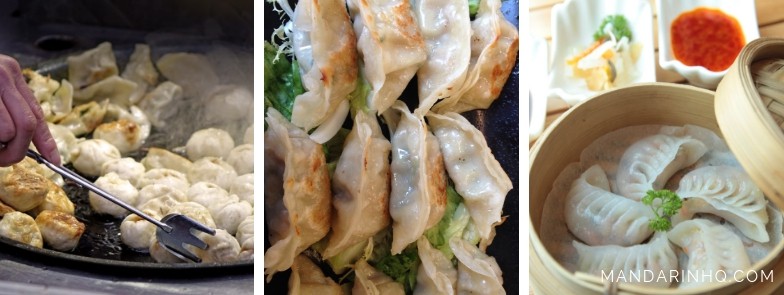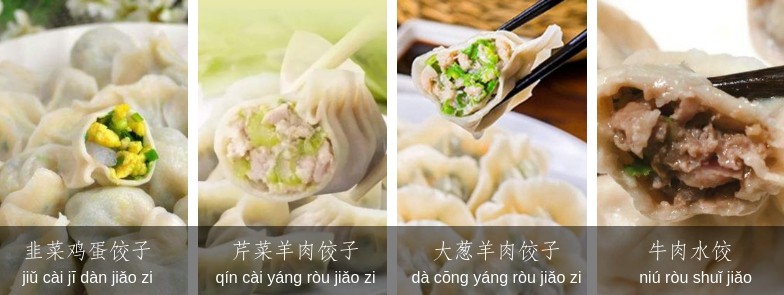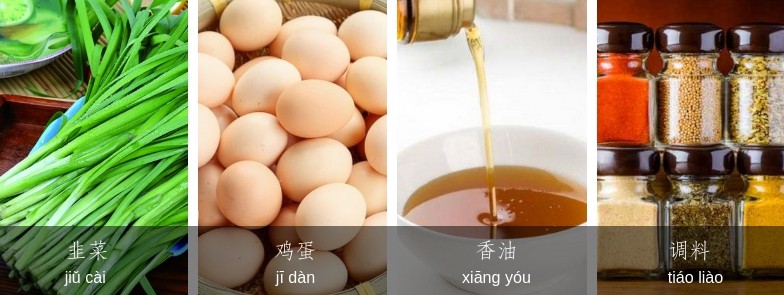Why do people in China eat dumplings at Chinese New Year?
Watch this video to practice your Chinese listening skills and find out!
Interview Dialogue Breakdown
Angel:
怎么称呼你?zěn me chēng hū nǐ?
How should I address you?
Resturantant Owner:
我姓苗。wǒ xìng miáo.
My last name is Miao.
Angel:
你好!我们吃了这里的菜,觉得这里的菜味道非常地好吃! nǐ hǎo! wǒ men chī le zhè lǐ de cài, jué de zhè lǐ de cài wèi dào fēi cháng de hǎo chī!
Hi! We have eaten the food here and think it's really tasty.
Angel:
然后,我想问你几个问题,可以吗?rán hòu,wǒ xiǎng wèn nǐ jǐ gè wèn tí, kě yǐ ma?
And I would like to ask you a few questions. Is that okay?
Resturantant Owner:
好, 你说!hǎo, nǐ shuō!
Yes, go ahead and ask!
Angel:
我想问一下这里有什么饺子?wǒ xiǎng wèn yī xià zhè lǐ yǒu shén me jiǎo zi?
I would like to ask "what kinds of dumplings do you have here?".
Resturantant Owner:
这里的饺子,现在来说,就是有韭菜鸡蛋,然后,有那个芹菜羊肉,有大葱羊肉,还有那个牛肉水饺。现在来说,反正比较单一些。以前我们上的品种很多的。
zhè lǐ de jiǎo zi, xiàn zài lái shuō, jiù shì yǒu jiǔ cài jī dàn, rán hòu, yǒu nèi gè qín cài yáng ròu, yǒu dà cōng yáng ròu, hái yǒu nèi gè niú ròu shuǐ jiǎo. xiàn zài lái shuō, fǎn zhèng bǐ jiào dān yī xiē. yǐ qián wǒ men shàng de pǐn zhǒng hěn duō de.
The dumplings that we have here, now, are Chinese leek & egg dumplings, and celery & lamb dumplings and green onion & lamb dumplings, and boiled beef dumplings. At the moment, the dumplings are a bit more simple. We used to serve many kinds of dumplings.
Angel:
我觉得这个韭菜鸡蛋饺子非常好吃。这个饺子是怎么样做的?wǒ jué de zhè gè jiǔ cài jī dàn jiǎo zi fēi cháng hǎo chī. zhè gè jiǎo zi shì zěn me yàng zuò de?
I think these Chinese leek and egg dumplings are really tasty. How do you make these dumplings?
Resturantant Owner:
这个饺子很简单,其实。在那个...像我们家里种的那个韭菜,然后就是有那个鸡蛋,知道吗?鸡蛋,把它炒熟了以后,打碎。然后,把这个韭菜,切好的韭菜放到一块儿。然后,用那个香油,就是那个咱自己家里边磨的那个小磨香油,非常地香的那种。然后再放一些调料在里面,很简单。zhè gè jiǎo zi hěn jiǎn dān, qí shí. zài nèi gè... xiàng wǒ men jiā lǐ zhǒng de nèi gè jiǔ cài, rán hòu jiù shì yǒu nèi gè jī dàn, zhī dào ma? jī dàn, bǎ tā chǎo shú le yǐ hòu, dǎ suì. rán hòu, bǎ zhè gè jiǔ cài, qiè hǎo de jiǔ cài fàng dào yī kuài er. rán hòu, yòng nèi gè xiāng yóu,jiù shì nèi gè zán zì jǐ jiā lǐ biān mó de nèi gè xiǎo mó xiāng yóu, fēi cháng de xiāng de nèi zhǒng. rán hòu zài fàng yī xiē tiáo liào zài lǐ miàn. hěn jiǎn dān.
It's very easy to make these dumplings, actually. It's the Chinese leek that we grow at our home, and then it's the eggs, you know. After frying the eggs, we break it into pieces. Then we mix the chopped Chinese leek with the eggs. Then we add some home-made sesame oil...It's the really fragrant kind of sesame oil. Then we put some spices into it. It's really simple.
Angel:
非常好吃!有妈妈的味道!很好!fēi cháng hǎo chī! yǒu mā mā de wèi dào! hěn hǎo!
It's really tasty! It tastes like home-made (lit. It has "mom's flavour")! Great!
Resturantant Owner:
就是简单的东西,反而是最好的!jiù shì jiǎn dān de dōng xī, fǎn ér shì zuì hǎo de!
Exactly, the simplest things are the best!
Angel:
为什么中国人喜欢过年的时候吃饺子呢?wèi shén me zhōng guó rén xǐ huān guò nián de shí hòu chī jiǎo zi ne?
Why do Chinese people like to eat dumplings at Chinese New Year?
Resturantant Owner:
这个...这个按传统意义上来讲呢,就是说...算是有几千年的历史了吧。自从我们小的时候就有这种传统。就是每年过年的时候要吃这个饺子。所以说,可能这个饺子就像一种金元宝吧。象征着财源滚滚那个意思哦。所以说,大家就是象征着吉祥富裕,这样哈。所以都比较喜欢,过年的时候都比较喜欢吃饺子。zhè gè... zhè gè àn chuán tǒng yì yì shàng lái jiǎng ne. jiù shì shuō... suàn shì yǒu jǐ qiān nián de lì shǐ le ba. zì cóng wǒ men xiǎo de shí hòu jiù yǒu zhè zhǒng chuán tǒng. jiù shì měi nián guò nián de shí hòu yào chī zhè gè jiǎo zi. suǒ yǐ shuō, kě néng zhè gè jiǎo zi jiù xiàng yī zhǒng jīn yuán bǎo ba. xiàng zhēng zhe cái yuán gǔn gǔn nèi gè yì sī ó. suǒ yǐ shuō, dà jiā jiù shì xiàng zhēng zhe jí xiáng fù yù, zhè yàng hā. suǒ yǐ dōu bǐ jiào xǐ huān, guò nián de shí hòu dōu bǐ jiào xǐ huān chī jiǎo zi.
Well... It's tradition. It has a couple of thousands years of history. We are introduced to this tradition when we are little. Every year at Chinese New Year we eat dumplings. So, maybe the dumplings look a bit like a gold ingot. Due to this similarity it's associated with "financial resources flowing". Therefore, everyone thinks that it symbolizes auspicious wealth... Something like that. So everyone likes to eat dumplings at Chinese New Year.
Angel:
很好!谢谢!谢谢!hěn hǎo! xiè xiè! xiè xiè!
Cool! Thank you! Thank you!
You might also find these posts interesting:



